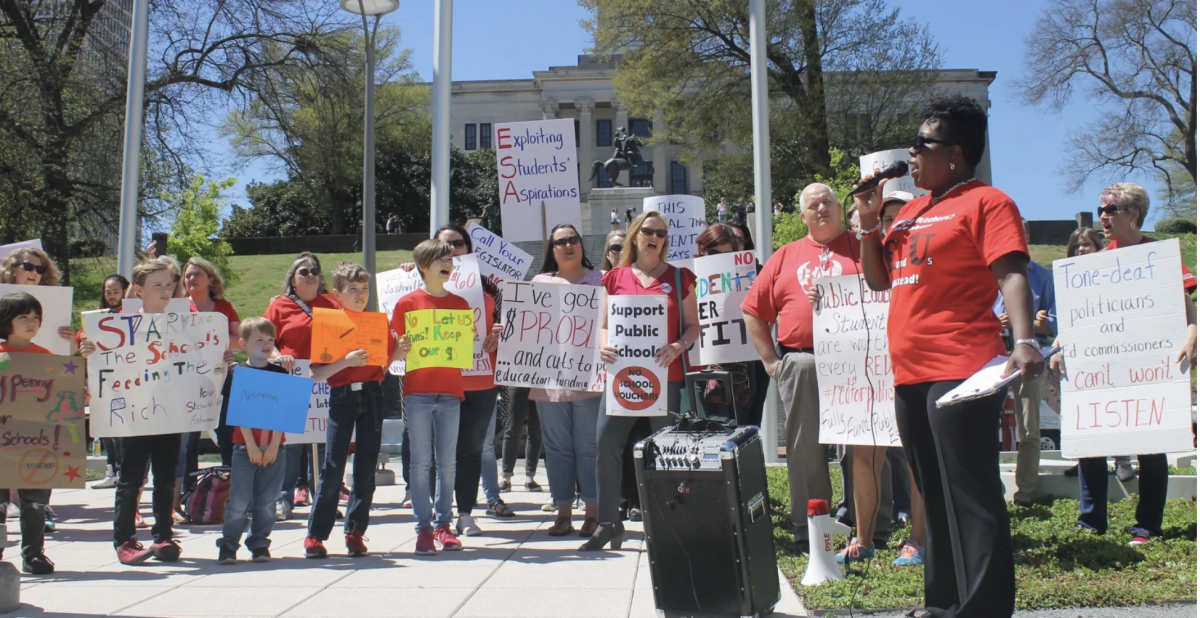Gov. Bill Lee cruised to a second term in office in Tuesday’s election, partly on his campaign pledge to Tennessee parents and teachers to “make the most of the next four years” on education. But he offered few details on exactly what that will mean.
The Associated Press reported that election results showed the Republican governor easily defeated Dr. Jason Martin, a Nashville physician and the Democratic Party’s nominee, whom he declined to debate. The ruby-red state hasn’t elected a Democrat to statewide office since 2006.
Lee’s landslide victory sets up the governor to claim a mandate for whatever he proposes through 2026, or to support any ambitions he might have for national office.
In his victory speech Tuesday evening, the governor said he will continue to elevate parental rights. He also touted public school investments under his administration, as well as expanding choices for families “who want something a little different for their kid” than traditional public schools.
“I’ll remind you for the next four years … that those two ideas are not in conflict with each other,” Lee said. “We can fund public schools and provide alternative opportunities for children at the same time if we are committed to funding students and not systems.”
During his campaign, Lee has been short on details about his second-term agenda for education. Instead, he’s emphasized staying the course on his first-term accomplishments, including rewriting Tennessee’s 30-year-old education funding formula, expanding middle and high school access to career and technical training, and grounding reading instruction in phonics.
Lee’s final 30-second campaign ad — part of a $3.2 million campaign spending blitz in October — also touted safer classrooms and ended with this promise: “Parents and teachers, you have my word that we’ll make the most of the next four years.”
Campaign spokeswoman Laine Arnold said the ad signaled Lee’s “intent to continue making education a top priority.”
Asked on the eve of Election Day for specifics about his education priorities for his second term, Lee said he again wants to invest more money toward teacher pay and further expand education choices through charter schools and private school vouchers. He also wants to continue prioritizing vocational, technical, and agricultural education.
“These are all things that we have implemented in the last four years, but we now have to make certain that those are growing, that they’re invested in, and that there’s significant improvement in all areas,” the governor told reporters during his final campaign stop in Franklin, south of Nashville.
But Democrats — who are still smarting that Lee pushed through a private school voucher law with a controversial, razor-thin vote during his first year in office — are interpreting the governor’s vague TV promise on education as an ominous threat.
They expect Lee and another GOP legislative supermajority to try to expand his education savings account program to shift more taxpayer money from public to private schools. Currently, the program is limited to Memphis and Nashville.
Democrats also expect more proposals to censor books and instruction in public schools.
In 2021, Tennessee became one of the first states to enact a law, which Lee signed, to restrict K-12 classroom discussions about the legacy of slavery, racism, and white privilege.
This year, Lee pushed through a law requiring reviews of school and classroom library collections. He signed a second measure that authorizes the state textbook commission to ban challenged materials statewide if its appointed members deem them “inappropriate” for students’ ages and maturity levels.
As for the Jan. 6 attack on the U.S. Capitol, Lee has said students should be taught that the deadly 2021 insurrection was a day of “lawlessness” by individual attackers. He has not referenced the broader plot, still under federal investigation, to disrupt the transfer of presidential power from Donald Trump to Joe Biden.
“Republicans have already started to systematically eradicate history in textbooks and ban teachings related to race, gender identity, and sexuality,” said Rep. Vincent Dixie, a Nashville Democrat who chairs his party’s House caucus. “Four more years under this leadership will only lead to more micromanagement of school curricula and stricter fines and punishment for our already overworked and underpaid educators.”
A businessman and farmer from affluent Williamson County, near Nashville, Lee surprised both political parties four years ago when he survived a bruising primary race and won his first bid for public office to become Tennessee’s 50th governor.
Campaigning for more education choices for families and vocational training options for students, he made education a top priority and used the state’s GOP muscle to pass much of his agenda.
But Lee suffered a humiliating blow this year after inviting the president of Michigan’s conservative Hillsdale College to bring up to 100 charter schools to Tennessee, only to have Hillsdale’s charter group withdraw its first three applications after a Lee-appointed panel found the proposals weren’t up to snuff.
Lee also was stung by public outrage — and criticized by numerous members of his own political party — after a leaked video showed him sitting silently at a private reception in June as Hillsdale’s president, Larry Arnn, mocked teachers, their training programs, and diversity officers. The governor declined to disavow Arnn’s remarks or disaffiliate with Hillsdale. Instead, he blamed “left-wing activism in public education” as hurting the “genuine work of our teachers.”
At the time, Lt. Gov. Randy McNally called Arnn’s comments “ill-conceived, unfortunate and untrue.” This week, the legislature’s top GOP leader said Lee’s accomplishments have offset any of the governor’s missteps over Arnn’s comments.
“I think voters have been looking at his entire record,” said McNally, who’s from Oak Ridge. “He was dealt the worst hand of any governor I can remember — with COVID, floods, tornadoes, and protests. I think he’s handled it very well.”
But Martin, a critical care doctor, said it was the governor’s hands-off approach to the COVID pandemic that spurred him to run against Lee. The Democratic nominee also criticized Lee-backed school voucher, charter, and censorship policies for giving the state ultimate control over those decisions at the expense of locally elected officials.
Other critics have said it’s hypocritical for Lee’s campaign ads to claim that children, families, and moms have been his “top priority,” when he has not supported expanding Medicaid to accept billions of dollars in federal health care benefits for the working poor.
The governor also helped to grow the state’s rainy day fund to record levels while its Department of Children’s Services — the state agency charged with caring for abused, neglected, and foster children — is severely understaffed and short of beds for children taken into custody.
Fresh from his Election Day victory, Lee will kick off budget hearings Wednesday to prepare for his 2023-24 state spending proposal, which he’ll present to the Tennessee General Assembly several weeks after lawmakers convene on Jan. 10.
Budget discussions about K-12 education with Education Commissioner Penny Schwinn are listed second on the four-day schedule.
Months before his reelection, Lee pledged to invest an additional $1 billion in students and schools next fiscal year, when federal pandemic relief funding is set to run out and the state’s new funding formula kicks in.
But while Lee was considered a heavy favorite for a second term in office, Schwinn’s future has been less certain.
The former Texas academic chief shepherded the governor’s major initiatives, including strategies to improve literacy and help students recover from pandemic learning loss, as well as expanding grow-your-own teacher training programs and implementing a new education funding formula that lets money follow the student, plus sets aside more money for students with higher needs.
But employee turnover at the state education department has been high under Schwinn’s leadership. And early on, she frustrated lawmakers for rolling out initiatives and taking administrative shortcuts without ample legislative input, review, or approval, even as she led Tennessee through the pandemic, considered the biggest education upheaval in modern history.
Asked last month if she expected to continue her role for a second term, Schwinn said she and Lee “have had those conversations.”
“I plan to be here, and we’re moving full steam ahead,” she told Chalkbeat.
She cited the state’s strategic plans on literacy, student acceleration, innovative school models, grow-your-own teacher training programs, and the state’s new funding formula.
“We are really proud of these big pieces of legislation that have passed and the interventions and work,” she said. “Now we have to double down and stay the course.”
This story has been updated with comments from Lee’s victory speech.
Marta W. Aldrich is a senior correspondent and covers the statehouse for Chalkbeat Tennessee. Contact her at maldrich@chalkbeat.org.
Chalkbeat is a nonprofit news site covering educational change in public schools.









